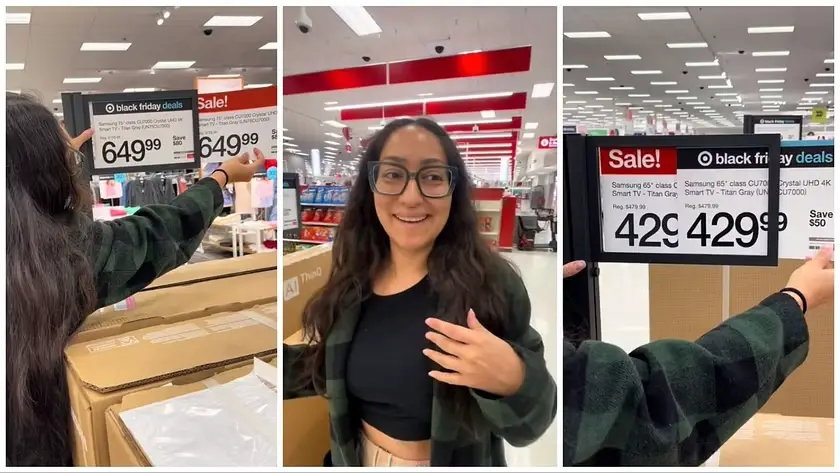Black Friday traditionally marks the beginning of the Christmas season and comes with exciting discounts that allow people to save money on various goods. However, this tradition may end if shoppers believe stores use misleading Black Friday sales to lure them in.
Multiple TikTok videos show popular brands advertising a Black Friday sale without changing the previous price.
One viral example is a video taken at Target showing a woman revealing the misleading black Friday deal for a Samsung TV was the same as the previous month’s sale, both at $649.99, hence a “misleading black Friday sale.”
She confirmed her suspicion by checking another Samsung TV sale, which sold at $329.99 on black Friday and the previous month.
While companies are free to decide the price of things they sell, the internet is curious whether these unchanging misleading black friday prices qualify as false advertising.
Attorney Ugo Lord Explains Misleading Black Friday Sales and False Advertisement
Fortunately, Tiktok star lawyer Ugo Lord can break legal jargon and provide expert opinions on viral cases.
In this misleading blFridayiday situation, Dr Lord reiterated that no deep discounted black Friday prices differed from the previously discounted sale. “But ladies and gentlemen…, he continues, “…legally speaking, as long as your sale price is different from the original price, it can still be considered a sale.”
Therefore, according to the TikTok attorney, Target’s stagnant discount deal doesn’t qualify as a false advertisement since the current price differs from the original price.
What Qualifies as Misleading Black Friday Deals or False Advertisement?
According to California General Business Regulations, “An advertised price cannot be similar to its former price except the previous amount was the prevailing market value within three months before the advertisement.”
In other words, the misleading blFridayiday item on sale must have a lower price than the original amount; otherwise, it qualifies as a false advertisement under California law.
At the same time, the FTC Act requires sellers to hold that discount offered for a reasonable period before changing it. Other, more specific requirements of the FTC guidelines include the following:
- Referencing the original, higher price in the ad
- Ensuring the item was recently available to customers at the former price
- Selling the original item at its former price for a reasonable amount of time before changing
Failing to meet these requirements and more makes a company more likely to be liable for false advertisement charges.

Lawsuit Against American Retailers
An excellent example of this misleading black friday case is Los Angeles City Attorney Mike Feuer’s four lawsuits against some big US retailers lying to customers about prices. He claims the retailers broke California laws by using false “original prices” and “sales prices” to make customers think they were saving money.
The lawsuits cited specific advertisements, products, dates, prices, and price tags as examples of misleading black Friday and false reference pricing. According to California law, you can’t use a former price unless it was the prevalent market price in the last three months.
Mike Feuer’s lawsuit dives deeper into how the retailers keep using false prices despite facing legal backlash for the same offense.
These suits aim to discipline these establishments legally and also emphasize the importance of:
1. Making policies and procedures that follow state, federal, and local pricing laws.
2. Training staff who set prices and do marketing and advertising.
3. Check and audit their sales practice regularly.
4. Keeping records of their ads and price tags.
Conclusion
Misleading black Friday prices is unethical, and people are more skeptical about the offers upon realizing this. One YouTube user comments on Ugo Lord’s video, saying, “I bought a dryer at Lowes two months ago at $536…for black Friday, they raised the price to $799 then dropped it to $540.”
While their method may technically be legal, according to Ugo Lord, others argue that it’s unethical as it tricks customers into spending more money when they wish to save.

